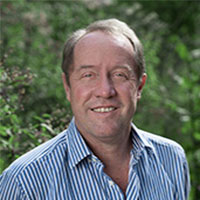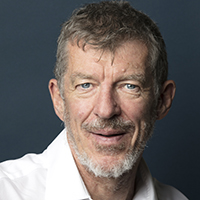Inspiring Queensland STEM professionals
This podcast series features interviews with Queensland Science, Technology, Engineering and Mathematics (STEM) professionals doing incredible work that impacts the lives of all Queenslanders. We learn just how interesting and rewarding a career in STEM can be.

Queensland’s Chief Scientist, Professor Hugh Possingham
Professor Hugh Possingham was appointed Queensland Chief Scientist in September 2020. Prior to taking the role, he was Chair of the Department of Mathematics and Biological Sciences at the University of Queensland, where he led several research centres and held Australian Research Council Professorial, Laureate and Federation Fellowships. He has had a long and distinguished career developing mathematical and economic tools for solving nature conservation problems. He co-developed the Marxan software for conservation planning, which has been described as “the most significant contribution to conservation biology to emerge from the Australia's research community”.
He was Director of the Australian Research Council Centre of Excellence for Environmental Decisions, as well as the Australian Government's Threatened Species Recovery Hub. In 2016, he became the Chief Scientist at The Nature Conservancy, a global conservation organisation with 400 scientists and 4000 staff. In 2016, Professor Possingham was also elected a Foreign Associate of the US National Academy of Sciences. He has co-authored more than 650 peer-reviewed papers, with more than 30 in the world’s top two scientific journals Science and Nature. He has a Bachelor's degree with Honours in Applied Mathematics from Adelaide University and was a Rhodes Scholar at Oxford University, graduating with a doctorate in Ecological Modelling.
SoundCloud podcastTranscript

Professor Ian Frazer
Professor Ian Frazer is a clinician scientist, trained as a clinical immunologist in Scotland. As a professor at the University of Queensland, he leads a research group working at Translational Research Institute (TRI) in Brisbane, Australia, on the immunobiology of epithelial cancers. He is recognised as co-inventor of the technology enabling the HPV vaccines, currently used worldwide to help prevent cervical cancer. He heads a biotechnology company, Jingang Medicine (Aus) Pty Ltd, working on new vaccine technologies, and is a board member of several companies and not-for-profit organisations. He was the inaugural president of the Australian Academy of Health and Medical Sciences, an Australian Academy of Sciences Fellow and a member of the Australian National Science and Technology Council. He chairs the Australian Medical Research Advisory Board of the Medical Research Future Fund. He was recognised as Australian of the Year in 2006. He was recipient of the Prime Minister’s Prize for Science, and of the Balzan Prize, in 2008, and was elected Fellow of the Royal Society of London in 2012. He was appointed Companion of the Order of Australia in the Queen’s Birthday Honours list in 2013.
SoundCloud podcastTranscript
Professor Peter Doherty
Professor Peter Doherty is best known for winning the Nobel Prize in Medicine in 1996, a fellow of the Australian Academy of Science and named Australian of the Year in 1997. He was born in 1940 in Brisbane, Queensland, where he attended local state schools including Indooroopilly State High School (which now has a lecture theatre named after him).
He is the Patron of the Peter Doherty Institute for Infection and Immunity at Melbourne University and the Queensland Department of Education Peter Doherty Awards for Excellence in Science, Technology, Engineering and Mathematics (STEM) Education were named in his honour.
SoundCloud podcastTranscript
Professor George Mellick
Professor George Mellick is the Head of School, at the School of Environment and Science, Griffith University Nathan campus. Most notably, he is the lead in the Queensland Parkinson’s Project and a renowned clinical neuroscientist (seen on media such as ABC radio, TV news and current affair interviews, and TEDx sessions). Professor Mellick is a proud Queenslander who grew up in Mareeba on the Atherton tablelands in FNQ.
In this interview, Professor Mellick chats about the importance of STEM education for teachers and students. He explains how scientists need to work together at this critical time during the COVID-19 outbreak and in relation to his ground-breaking research at the Griffith Research Institute for Drug Discovery.
For more information about STEM as a career checkout the
STEM Hub.
SoundCloud podcastTranscript
STEM careers
Holly Wright
Holly wright is a cybersecurity software engineer and product owner at IBM. She specializes in building technology that lets companies detect when they are being attacked. She graduated with a Bachelor of Engineering (Honours)—mechatronics from the University of Queensland. She has received several awards including best automation and control thesis project (2016), best non-thesis project for final-year team project product (2016) and ABB Pty Ltd engineering scholarship (2013–2016). She is fluent in 9 computer languages and has 4 patent disclosures.
SoundCloud podcastTranscript
Sam Sinnamon
Sam Sinnamon is a senior software developer at a software development company in Brisbane. He graduated with a Bachelor of Information Technology from the University of Queensland and was a Prentice Scholar (he was in the top 10% of students) throughout his degree. He is a coding leader and developer mentor for graduate developers.
SoundCloud podcastTranscript
Dr Rebecca Adams—Haematologist
Dr Rebecca Adams is a consultant haematologist at Sullivan Nicolaides Pathology, Brisbane. She reports across all areas of diagnostic haematology. She graduated in medicine with First Class Honours from the University of Queensland in 2004. She was awarded several academic prizes including the University Medal for Medicine and the Charles Miford Lilley Memorial Prize for greatest merit in surgery. Dr Adams holds a number of roles in training and education.
As well as being responsible for the teaching of registrar, scientists and students who rotate through the Haematology department, she is the RCPA's Network Coordinator of Advanced Haematology training in Queensland. She is an RCPA examiner in haematology and a reviewer for the college's pathology journal. She is also a senior lecturer at The University of Queensland.
SoundCloud podcastTranscript
Dr Nela Durisic—Neuroscientist
Dr Nela Durisic is a neuroscientist at the Queensland Brain Institute. She has worked as a scientist in the US, Canada, Spain and Australia. Nela is using physics principles to answer biological questions such as how neurons in a healthy brain communicate and how that communication is disrupted in genetic epilepsies. She is studying the movement of single molecules in live brain cells by combining cutting edge microscopy methods, including super-resolution imaging, with state-of-the-art molecular biology tools and electrophysiology.
Her research aims to enable precision-based therapeutic strategies for people with genetic epilepsies which are also free from the side effects seen with currently available therapies. For her work, Nela has been awarded several academic prizes, fellowships and research grants, and she has secured almost $1 million in research funding.
SoundCloud podcastTranscript
Dr Sam Hinton—Astrophysicist
Dr Sam Hinton is an astrophysicist at the University of Queensland. He is currently the lead data analyst with the Queensland-based COVID-19 Critical Care Consortium and a post-doctoral researcher in the area of supernova cosmology.
He has won numerous academic awards including the Australian Institute of Physics Prize for the top physics graduate, and the University Medal for Science and the University Medal for Engineering from the University of Queensland. He is also a previous Rhodes Scholarship finalist and was a contestant on Survivor 2018.
SoundCloud podcastTranscript